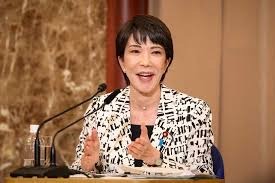Sanae Takaichi, 64, on Tuesday made history as she became first woman prime minister after a China hawk and social conservative, forged an 11th-hour coalition deal.
The lower house of parliament appointed Takaichi, an admirer of Margaret Thatcher, as prime minister on Tuesday, after she unexpectedly won a slim majority in a first round of voting.
Looking serious, Takaichi bowed several times to lawmakers.
The upper house then voted in her favour, although in a runoff after Takaichi fell short of a majority. Takaichi will formally take office after meeting the emperor later.
Takaci, who is Japan’s fifth premier in as many years will lead a minority government and has a bulging in-tray, not least a scheduled visit by US President Donald Trump next week.
Recall that Takaichi, the former heavy metal drummer became on October 4 head of the Liberal Democratic Party (LDP), which has governed almost non-stop for decades but is losing support.
Six days later, the Komeito party, uncomfortable about Takaichi’s conservative views and an LDP slush fund scandal, quit their coalition.
This forced Takaichi to form an alliance with the reformist, right-leaning Japan Innovation Party (JIP), which was signed on Monday evening.
JIP wants to lower the consumption tax rate on food to zero, abolish corporate and organisational donations, and reduce the number of MPs.
Takaichi, who pledged Monday to “make Japan’s economy stronger and reshape Japan as a country that can be responsible for future generations, ” also promised a cabinet with “Nordic” levels of women, up from two under outgoing premier Shigeru Ishiba.
It was gathered that these could include the right-wing Satsuki Katayama in charge of finances and the half-American Kimi Onoda as economic security minister, local media said.
Japan ranked 118 out of 148 in the World Economic Forum’s 2025 Global Gender Gap Report. Around 15 percent of lower house MPs are women, and corporate boardrooms are overwhelmingly male.
Takaichi has said she hopes to raise awareness about women’s health struggles and has spoken candidly about her own experience with menopause.
But she opposes revising a 19th-century law requiring married couples to share the same surname, and wants the imperial family to stick to male-only succession.











